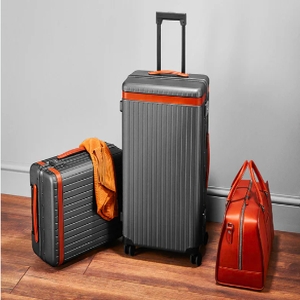
Congratulations on receiving your offer letter! As you prepare for your journey to Canada, packing wisely is crucial. With varying weather conditions, airline baggage restrictions, and the need for essential documents, a well-planned packing list will ensure a smooth transition. Below is the ultimate packing guide for international students moving to Canada in 2025.
Essential Packing List for International Students
1. Travel Documents
Ensure you carry all necessary documents in a secure and accessible bag. These include:
-
Passport (valid for at least six months)
-
Student Visa and Study Permit
-
University Offer/Acceptance Letter
-
Flight Tickets and Travel Itinerary
-
Health and Travel Insurance Documents
-
Proof of Funds (bank statements, financial guarantee letters)
-
Copies of Important Documents (both digital and physical backups)
2. Clothing
Canada experiences diverse seasons, so packing appropriate clothing is essential.
-
Winter (November to March): Heavy jackets, thermal wear, gloves, woolen socks, waterproof boots, scarves, and beanies.
-
Spring/Fall (April to May/September to October): Light sweaters, hoodies, jackets, jeans, and waterproof shoes.
-
Summer (June to August): Light clothing, breathable fabrics, shorts, T-shirts, sunglasses, and sunscreen.
-
Formal Attire: Consider packing one or two formal outfits for presentations, networking events, or interviews.
-
Casual and Everyday Wear: Comfortable clothing for daily use and indoor wear.
3. Personal Hygiene Items
While most toiletries are available in Canada, bringing some essentials for the initial weeks is advisable.
-
Toothbrush, toothpaste, shampoo, soap, deodorant, and face wash
-
Razor, shaving cream, and aftershave (for men)
-
Haircare products, moisturizer, and skincare routine items
-
Feminine hygiene products (for women)
4. Medications and First Aid Kit
Pack necessary medications along with prescriptions, as some might not be readily available.
-
Prescribed medications and doctor’s prescription
-
Pain relievers (Paracetamol, Ibuprofen)
-
Allergy and flu medications
-
Antiseptic cream, bandages, and basic first aid supplies
5. Electronics and Gadgets
Technology plays a significant role in student life, so ensure you carry the necessary devices.
-
Laptop (for assignments and online classes)
-
Mobile Phone (unlocked for use with a Canadian SIM card)
-
Chargers and Adapters (Canada uses 110V power supply, Type A/B plug)
-
Power Bank
-
Headphones or Earphones
-
USB Flash Drive or External Hard Drive (for extra storage)
6. Financial Items
-
Credit/Debit Cards (International or Forex Cards)
-
Canadian Dollars (CAD) in Cash (for immediate expenses)
-
Student Loan or Scholarship Documents
-
Bank Statements (if required by the university or immigration)
7. Study Materials
Books can be heavy and expensive; carry only essential ones and purchase the rest in Canada.
-
Notebook and Pens
-
Reference Books (if required by the university)
-
Dictionary or Language Guide (if English/French isn’t your first language)
8. Miscellaneous Items
-
Reusable Water Bottle
-
Small Toolkit (screwdriver, scissors, tape)
-
Umbrella and Raincoat
-
Sunglasses
-
Backpack for daily use
-
Traditional Attire (for cultural events or festivals)
-
Sentimental Items (family photos, small mementos)
Items to Buy After Reaching Canada
Once you arrive in Canada, there are some items you may prefer to purchase locally to save luggage space and weight.
1. Bedroom Essentials
-
Bed sheets, pillows, and blankets
-
Mattress (if accommodation does not provide one)
-
Storage boxes or organizers
2. Kitchen Essentials
-
Cooking utensils, pots, and pans
-
Cutlery, plates, and cups
-
Groceries and non-perishable food items
3. Bathroom and Laundry Supplies
-
Towels and washcloths
-
Laundry detergent and fabric softener
-
Cleaning supplies (broom, mop, all-purpose cleaner)
4. Study and Office Supplies
-
Stationery (pens, notebooks, sticky notes)
-
Printer and ink (if necessary for your studies)
5. Electronics and Connectivity
-
Canadian SIM card
-
Wi-Fi router (if required for your accommodation)
Seasonal Packing Guide for Canada
Summer (June – August)
-
Light, breathable clothing
-
Comfortable walking shoes
-
Sunglasses and sunscreen
-
Hat/cap
Winter (November – March)
-
Heavy winter coats and jackets
-
Thermal socks, gloves, scarves, and woolen hats
-
Waterproof snow boots
-
Layered clothing (sweaters, thermals, fleece)
FAQs about Packing for Canada as an International Student
1. How many bags are allowed for international students flying to Canada?
Baggage allowance varies by airline. Generally, most airlines allow:
-
1-2 checked bags (23 kg each)
-
1 carry-on bag (7-10 kg)
-
1 personal item (small backpack or laptop bag) Check with your airline for exact details to avoid extra baggage fees.
2. What are the restricted items when traveling to Canada?
Canada has strict regulations on what you can bring. Avoid packing:
-
Fresh fruits, vegetables, and dairy products
-
Weapons and firearms
-
Illegal substances and drugs
-
Counterfeit or pirated items
-
Items made from endangered species (ivory, fur, etc.)
3. What is the dress code for colleges in Canada?
Most universities in Canada have a casual dress code. However, some programs like Business or Healthcare may require formal attire or scrubs.
4. How much cash can I carry from India to Canada?
You can bring any amount, but if it exceeds CAD 10,000, you must declare it at customs.
5. What should I not pack when traveling from India to Canada?
Avoid packing heavy cookware, excess toiletries, books, and items prohibited by Canadian customs.
Final Thoughts
Moving to Canada as an international student is an exciting journey. Having a well-prepared packing list will help ease the transition and ensure you carry all the essentials without exceeding baggage limits.
If you need further assistance with your admission process or student life in Canada, feel free to reach out to our expert advisors. Safe travels and best of luck on your academic journey in Canada!